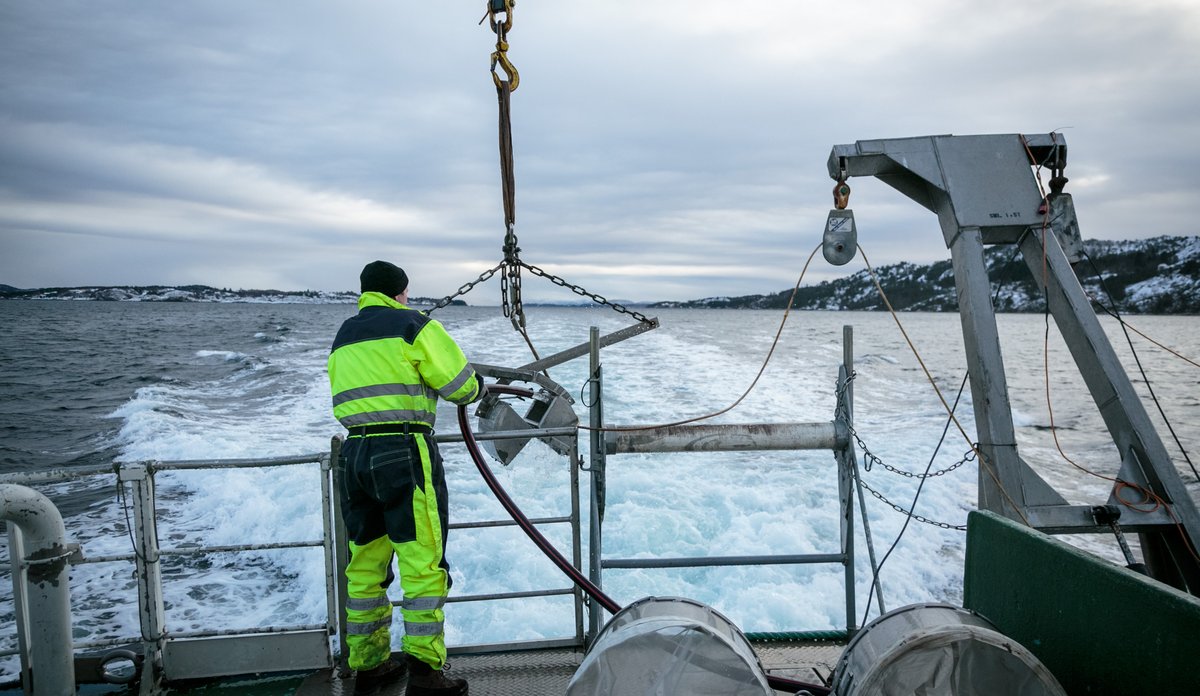Going global: Researchers aim to collect and organize data on plastic pollution from around the world

The Institute of Marine Research (IMR) collects data on plastics on several of its research cruises. The image is from a test cruise in January 2018, where various methods were tried out.
Photo: Erlend Astad Lorentzen / IMRPublished: 23.06.2021
Few if any places today are untouched by plastic pollution. Plastic is transported over long distances by sea, air, water, and animals, and often ends up in remote areas, from the top of the Himalayas to Norway's deepest marine trenches.
But although the problem has received much attention in recent years, real solutions have so far been elusive.
Knowledge to achieve UN-SDGs
Together with colleagues from four continents, IMR researcher Bank has now taken the initiative to establish a global monitoring system for plastics to help monitor and support solutions to this global problem.
The goal of what researchers call the Global Plastic Observation System, or GPOS – recently launched in the pages of Environmental Science & Technology – is to acquire knowledge that can support greater global efforts for clean and safe oceans.
“Plastic pollution affects, among other things, water quality, fisheries, the environment and sustainability. A global observation system, as the one proposed here, can contribute to achieving the UN's Sustainable Development Goals (SDGs) and ambitions in the new Decade of Ocean Science,” says Bank, with an emphasis on SDG 14, “Life below water”.
Lacking a common system
Today, plastics and microplastics are monitored in different ways by different actors, in different countries and different ecosystem types including land, air, freshwater, and the ocean.
Different procedures for data collection and reporting make it difficult to form an overall picture of the situation, especially when it comes to how plastic cycles between different environmental compartments and governance jurisdictions.
The idea of GPOS is to harmonize the monitoring of data in a way that makes it possible to assess the extent of the plastic problem, and to give accurate advice on remediation and adaptation strategies.
“There has been a consensus among plastic researchers that we lack a global system for monitoring plastic pollution in the sea, with common measurement methods and models to support evidence-based mass balance information to guide effective policy measures. Therefore, this is really an idea that is widely endorsed and really easy for people to get behind,” says Michael Bank.
Requires harmonized methods
Apart from Norway, the researchers behind the initiative come from Monaco, Saudi Arabia, Germany, the Netherlands, United Kingdom, Canada, USA, Chile, and Korea.
In the recent Environmental Science & Technology article, they provide a “proof of concept” for how the GPOS could work, building on existing initiatives and infrastructure.
“This is where the work begins. We need to obtain funding, involve governments, research communities and other actors, and get various groups to report and share their data, so that they can be incorporated into a global system,” says Michael Bank.
He points out that technology and data capacity are constantly improving, making data collection easier.
“The challenge now is to get harmonized methods, which are faster and more robust.”
Norway contributes to global plastic efforts
As there is no separate UN convention on plastics, much of the international work currently takes place under the Basel Convention on the Control of Transboundary Movements of Hazardous Wastes and their Disposal. It was during meetings in the Basel convention that the idea of GPOS arose.
Countries including Norway are now pushing for a global treaty on plastic pollution. Under such an agreement, GPOS would be able to contribute with scientific advice and time series data that make it possible to track progress and to support effectiveness evaluation of the potential policy measures that are undertaken.
With its researchers, vessels, laboratories and international networks, Michael Bank believes the IMR can play an important role in putting such a global monitoring system into place.
“Our research cruises have global scale coverage, all throughout Northern Europe, but also in Asia and Africa with RV Dr. Fridtjof Nansen, from the Arctic to Antarctica with RV Kronprins Haakon and around the world with Statsraad Lehmkuhl on the One Ocean Expedition.”
“By taking advantage of these oceanographic cruises, and connecting with other groups, IMR can become a leader and a key contributor to this global scale effort,” says Bank.